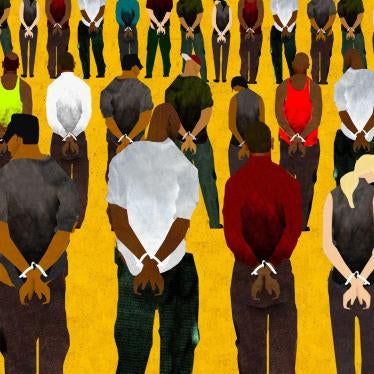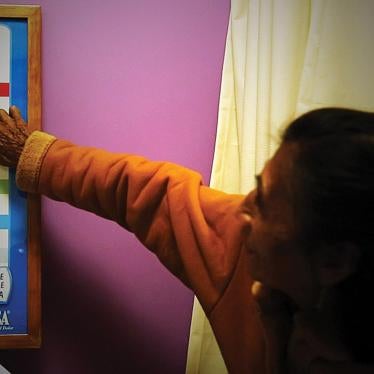(New York, October 10, 2008) - Governments around the world, including those in low and middle income countries, should take urgent action to stop the unnecessary suffering of millions of people from severe but treatable pain, Human Rights Watch said today, ahead of World Hospice and Palliative Care Day on October 11.
Tens of millions of people worldwide suffer from severe pain due to cancer, HIV and AIDS, and other health conditions. Although most pain can be treated effectively with inexpensive medications, government inaction or obstruction denies its victims access to pain treatment in many countries.
"Allowing millions of people to suffer unnecessarily when their pain can be effectively treated violates their right to the best possible health," said Diederik Lohman, senior researcher in the HIV/AIDS program of Human Rights Watch. "Policy makers worldwide can and should address this."
Eighty percent of the world's people do not have adequate access to pain treatment, the World Health Organization (WHO) estimates. This is often due to overzealous drug control efforts and poor training for health care workers.
Severe pain is a common symptom of cancer, HIV/AIDS, and other life-threatening conditions, especially in the late stages. An estimated 7 million people die of cancer every year; more than 2 million of AIDS. Up to 80 percent of these people may suffer severe pain, some for months on end.
Low and middle income countries - home to half of world's cancer patients and 95 percent of people with HIV - account for just 6 percent of worldwide use of morphine, the safe and inexpensive drug that is, according to WHO, absolutely necessary for the treatment of severe pain. Considerable problems with access to pain treatment are also reported in some industrialized countries.
Under international drug control conventions and human rights treaties, countries are obliged to ensure availability of narcotic drugs for pain treatment. Yet many nations have failed to respond with appropriate policy steps, in spite of repeated reminders from UN drug control bodies and the WHO.
"Failure of leadership is a chief cause of the pain treatment gap," said Lohman. "We know how to treat pain and the key drugs are cheap to produce and distribute. What is lacking is the will and commitment to improve access. Governments must not stand by while people suffer."
Numerous studies identify the following common problems:
- Many countries do not recognize palliative care and pain treatment as priorities in health care, have no relevant policies, have never assessed the need for pain treatment or examined how well that need is met and have not examined the barriers to such treatment.
- Narcotic drug control regulations or enforcement practices in many countries impose unnecessary restrictions that limit access to morphine and other opioid pain relievers. They create excessively burdensome procedures for procurement, safekeeping, and prescription of these medications and sometimes discourage health care workers from prescribing narcotic drugs for fear of law enforcement scrutiny.
- In many countries, medical and nursing school curricula do not include instruction on palliative care and pain treatment, meaning that many health care workers have inaccurate views of morphine and lack the knowledge and skills to treat pain adequately.
These failures result in unnecessary suffering for people with moderate to severe pain and their families. For example:
- An HIV-positive man in India has described to Human Rights Watch how he did not receive treatment for severe pain he experienced when he developed spinal tuberculosis in 2007. At the local AIDS clinic, where he was already receiving anti-retroviral treatment, doctors put him on tuberculosis treatment and said that the pain would automatically disappear as the TB treatment progressed. But six months passed before the pain began to subside.
- In September 2008, a woman in Colombia placed a classified ad in a local newspaper, saying: "Cancer is killing us. Pain is killing me because for several days I have been unable to find injectable morphine in any place. Please Mr. Secretary of Health, do not make us suffer any more." The woman had not been able for several months to get a steady supply of morphine to treat her daughter's pain because it was unavailable from pharmacies.
- A doctor at a hospice in Kenya told Human Rights Watch in 2007: "Physicians are afraid of morphine. ... Doctors [in Kenya] are so used to patients dying in pain...they think that this is how you must die. They are suspicious if you don't die this way - [and feel] that you died prematurely."
Yet, several low and middle income countries have made considerable progress in making pain treatment available. For example, Romania, Uganda, and Vietnam have all developed palliative care policies in recent years, have begun reworking problematic narcotics regulations and enforcement practices and have started training programs for doctors and nurses.
"Romania, Uganda, and Vietnam have convincingly shown that, with leadership, low and middle income countries can make important progress in closing the pain treatment gap," said Lohman. "Other countries should follow their example."
The ongoing drug policy review process at the Commission on Narcotic Drugs, the lead UN body on international drug policy, is an opportunity to set ambitious and measurable goals to improve access to pain treatment. The inclusion of a reference to pain treatment in the conclusions of a recent meeting in Vienna on reduction of demand for illicit drugs is an important first step, but more must be done.
Human Rights Watch calls on all countries to develop and carry out palliative care and pain treatment policies, if they have not already done so, to review their narcotics regulations to ensure that they do not interfere with medical use of morphine and other opioid medications, and ensure that palliative and pain treatment are included in training curricula for doctors and nurses.







